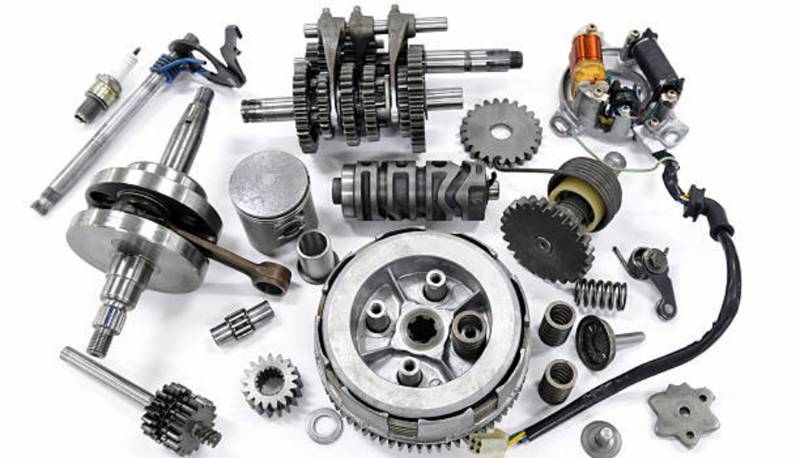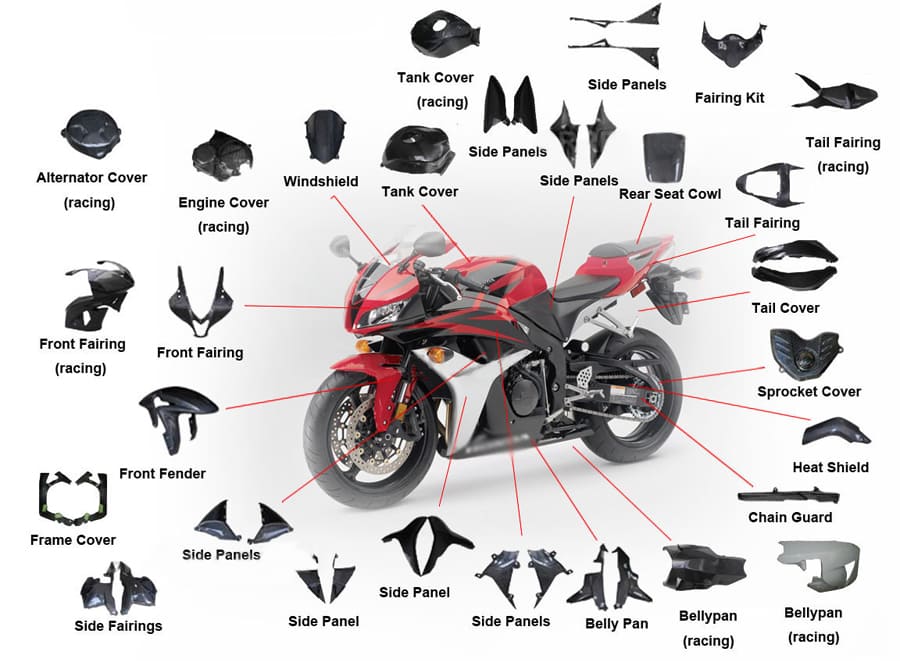A Deep Dive Into Performance Tuning with Bike Parts Wellington
A Deep Dive Into Performance Tuning with Bike Parts Wellington
Blog Article
Discover the Necessary MotorBike Parts You Need for Optimum Performance
Understanding the vital parts of a motorcycle is essential for accomplishing peak performance. Each component, from the engine to the stopping system, plays an important duty in general performance and security. Regular upkeep can avoid unforeseen failures and improve the riding experience. Nevertheless, lots of cyclists overlook the intricacies of these systems. Discovering just how they interact can lead to an extra efficient trip. What vital elements should every rider prioritize?
The Engine: The Heart of Your Motorcycle
The engine acts as the core part of a bike, driving its efficiency and specifying its capacities. It is responsible for transforming gas right into mechanical power, which powers the bike ahead. Various sorts of engines are used, consisting of single-cylinder, V-twin, and inline configurations, each offering distinctive features suited for different riding designs and functions. The engine size, generally gauged in cubic centimeters (cc), substantially influences performance, with bigger engines normally providing more power and torque.Furthermore, the engine's design and innovation, such as fuel shot systems or air-cooling versus liquid-cooling, impact performance and reliability. Maintenance is essential for peak procedure; factors like normal oil changes and checking ignition system guarantee longevity. Motorcyclists typically think about an engine's responsiveness and level of smoothness, as these features enhance the overall riding experience. Inevitably, the engine continues to be a critical element that defines not only the motorbike's performance yet likewise the rider's link to the machine.
The Transmission: Shifting Gears Smoothly
The transmission plays a necessary function in a motorbike's efficiency, especially in the mechanics of equipment changing. Recognizing just how to move equipments efficiently can boost the overall riding experience, while regular maintenance guarantees peak capability. Proper attention to these facets can significantly impact the long life and performance of the motorcycle.

Gear Shifting Mechanics
Smooth gear changing is important for optimal motorbike efficiency, greatly influencing both velocity and control. The auto mechanics of gear moving entail the interaction in between the clutch, gear bar, and transmission system. When a cyclist engages the clutch, it disengages the engine from the transmission, enabling an equipment modification without harming the parts. A well-timed launch of the clutch, incorporated with exact activity of the equipment bar, helps with a smooth modification in between equipments. This process assures that the engine runs within its best power band, boosting efficiency. Motorcycle Parts Auckland. Furthermore, comprehending the equipment ratios and their impact on speed and torque can help bikers make informed choices throughout changes, inevitably adding to an extra responsive and delightful riding experience
Maintenance Tips Importance
Regular upkeep plays a vital function in assuring that the transmission system runs efficiently, permitting smooth equipment shifts. Routinely changing the transmission and examining liquid is crucial, as old liquid can lead to boosted friction and wear. In addition, checking the clutch for wear assurances peak engagement and disengagement, stopping slippage throughout gear changes. Lubrication of moving components is equally essential to minimize rubbing and enhance efficiency. Motorbike proprietors need to likewise keep an eye on for leakages and unusual noises, as these can suggest underlying concerns. By sticking to these maintenance tips, riders can prolong the life-span of their transmission system, guaranteeing that equipment changes remain smooth and contributing to the general efficiency of their motorcycle.
The Braking System: Ensuring Safety on Every Adventure
Braking systems are essential parts that straight influence a motorbike's security and performance. They contain numerous parts, consisting of brake pads, blades, calipers, and hydraulic lines, all collaborating to ensure efficient slowdown. The type of stopping system-- typically either disc or drum-- influences responsiveness and quiting power.Regular upkeep is necessary to support peak performance; used brake pads can lead to reduced efficiency and boosted stopping ranges. Additionally, the top quality of brake liquid must be kept track of, as it can soak up dampness in time, jeopardizing braking efficiency.Riders must likewise think about the value of anti-lock stopping systems (ABS), which stop wheel lockup throughout abrupt stops, boosting overall security. Effectively operating brakes are not nearly stopping; they instill confidence in the rider, enabling safer navigating via various surfaces. Inevitably, a reputable stopping system is critical for taking pleasure in every adventure with peace of mind.
The Suspension: Enhancing Convenience and Control
A well-functioning suspension system substantially adds to a motorcycle's general performance, matching the efficiency of the stopping system. The suspension plays a significant role in taking in shocks from unequal surface areas, guaranteeing a smoother trip while keeping tire call with the road. This contact is vital for both stability and control, permitting motorcyclists to navigate corners with confidence and precision.Different types of shock absorber, such as telescopic forks or mono-shocks, provide varying degrees of convenience and handling. Effectively tuned suspension enhances responsiveness, giving the biker with an extra connected feeling to the motorbike. Routine upkeep checks are crucial to determine the suspension components, consisting of dampers and springtimes, are working at their ideal. An efficient shock absorber not only elevates the riding experience but likewise adds to the durability of various other motorcycle parts by lessening deterioration. Therefore, buying web top quality suspension is vital for any type of major motorcycle fanatic.
The Tires: Connecting You to the Road
Tires play an essential duty in a motorbike's efficiency, working as the key link in between the rider and the road. Recognizing the various types of tires readily available can considerably impact managing and safety. Additionally, routine maintenance is crucial to assure peak tire efficiency and long life.
Tire Types Explained
Exactly how do different tire kinds affect a motorcycle's performance? Tire kinds play an important role in figuring out a motorcycle's grip, handling, and security. Sport tires, created for high performance, deal boosted grip and responsiveness on paved roadways, making them perfect for competing and hostile riding. On the other hand, touring tires focus on resilience and convenience, offering a smoother experience for long-distance traveling. Off-road tires, defined by their sturdy walk patterns, stand out in traction on unpaved surfaces, suitable for journey fanatics. Furthermore, dual-sport tires mix characteristics from both off-road and on-road categories, accommodating versatile riding needs. Eventually, selecting the appropriate tire type is crucial for optimizing performance, making certain safety, and enhancing the general riding experience.
Maintenance Tips Offered
While riding on the road, maintaining ideal tire condition is crucial for safety and efficiency. Consistently inspecting tire pressure is important, as under-inflated tires can cause poor handling and increased wear. It is advisable to check step deepness regularly; used tires compromise hold and security. In addition, bikers should try to find indications of damages, such as bulges or fractures, which can suggest the demand for substitute. Turning tires occasionally ensures also wear, boosting durability. Maintaining tires clean from particles and preventing too much aesthetics can prolong their life-span. Finally, keeping appropriate placement and balance adds to peak performance, decreasing anxiety on various other bike components. Complying with these maintenance tips will substantially improve the overall riding experience.
The Gas System: Fueling Efficiency and Efficiency
The gas system plays an essential role in optimizing a motorbike's efficiency and performance, as it assures the ideal distribution of gas to the engine. It comprises numerous vital components, consisting of the gas tank, gas pump, fuel filter, and gas injectors or carburetor. Each part has to function effectively to ensure a powerful and smooth ride.The fuel storage tank shops gasoline and provides it to the engine via the fuel pump, which produces the necessary stress. A fuel filter protects against impurities from getting in the engine, while the injectors or carburetor mix gas with air for combustion.Proper maintenance of the gas system is important; a blocked filter or malfunctioning injector can cause reduced performance and increased fuel consumption. By verifying that the fuel system operates efficiently, cyclists site here can take pleasure in better throttle feedback, better gas economic climate, and in general improved riding experience.
The Electric System: Powering Your Experience
A reliable electrical system is vital for the general performance and safety of a motorbike, as it powers crucial components such as the ignition, lights, and various digital systems. This system consists of the battery, which stores energy, and the alternator, accountable for generating power while the engine runs. The wiring harness links these elements, ensuring reputable power distribution.Additionally, merges safeguard the system from overloads, while relays assist regulate high-current tools with low-power signals. A well-maintained electric system boosts performance by ensuring smooth beginnings and consistent operation of lights and signals, vital for motorcyclist presence and safety.Regular checks of the battery's charge and links are very important for avoiding electric failings. Bikers ought to additionally evaluate circuitry for wear and tear, making certain all elements operate preferably. Inevitably, a durable electrical system contributes considerably to the overall performance and reliability of the motorbike.
Frequently Asked Questions
Just how Commonly Should I Replace My Bike's Battery?
The frequency of motorbike battery substitute depends on usage and maintenance (Bike Parts Wellington). Normally, batteries should be changed every 3 to 5 years. Routine checks can assist identify when a replacement is essential for peak efficiency
What Devices Do I Required for Basic Bike Upkeep?
For standard motorcycle upkeep, one calls for essential devices such as an outlet set, wrenches, screwdrivers, pliers, tire pressure gauge, and a torque wrench. These tools assist in reliable upkeep and ensure the bike runs successfully and safely.
Just How Can I Boost My Bike's The rules of aerodynamics?
To boost motorbike aerodynamics, one must think about adjusting fairings, using windscreen extensions, enhancing body placement, and reducing overall weight. These Get More Information alterations aid minimize drag, improving security and fuel performance during rides.
What Are the Indicators of a Failing Electric System?
Signs of a failing electric system consist of dimming lights, problem starting, uneven instrument analyses, and blown merges. Oem Parts New Zealand. Uncommon scents or rust around battery terminals may also indicate underlying concerns needing prompt interest for safety and security and performance

Exactly how Do I Select the Right Oil for My Motorbike?
When selecting oil for a motorbike, one need to take into consideration the maker's specifications, viscosity rankings, and the kind of riding. Furthermore, artificial versus standard oil can affect efficiency and engine defense, influencing the decision greatly. The engine size, typically gauged in cubic centimeters (cc), substantially affects performance, with larger engines generally supplying more power and torque.Furthermore, the engine's style and technology, such as gas injection systems or air-cooling versus liquid-cooling, affect effectiveness and integrity. A well-functioning suspension system greatly adds to a motorbike's general efficiency, matching the effectiveness of the braking system. The gas system plays an important duty in making the most of a motorcycle's performance and efficiency, as it assures the ideal shipment of gas to the engine. A gas filter prevents contaminants from going into the engine, while the injectors or carburetor mix fuel with air for combustion.Proper maintenance of the gas system is crucial; a stopped up filter or malfunctioning injector can lead to lowered efficiency and boosted gas intake. A well-kept electric system improves efficiency by ensuring smooth begins and constant procedure of signals and lights, crucial for motorcyclist presence and safety.Regular checks of the battery's charge and connections are vital for stopping electric failures.
Report this page